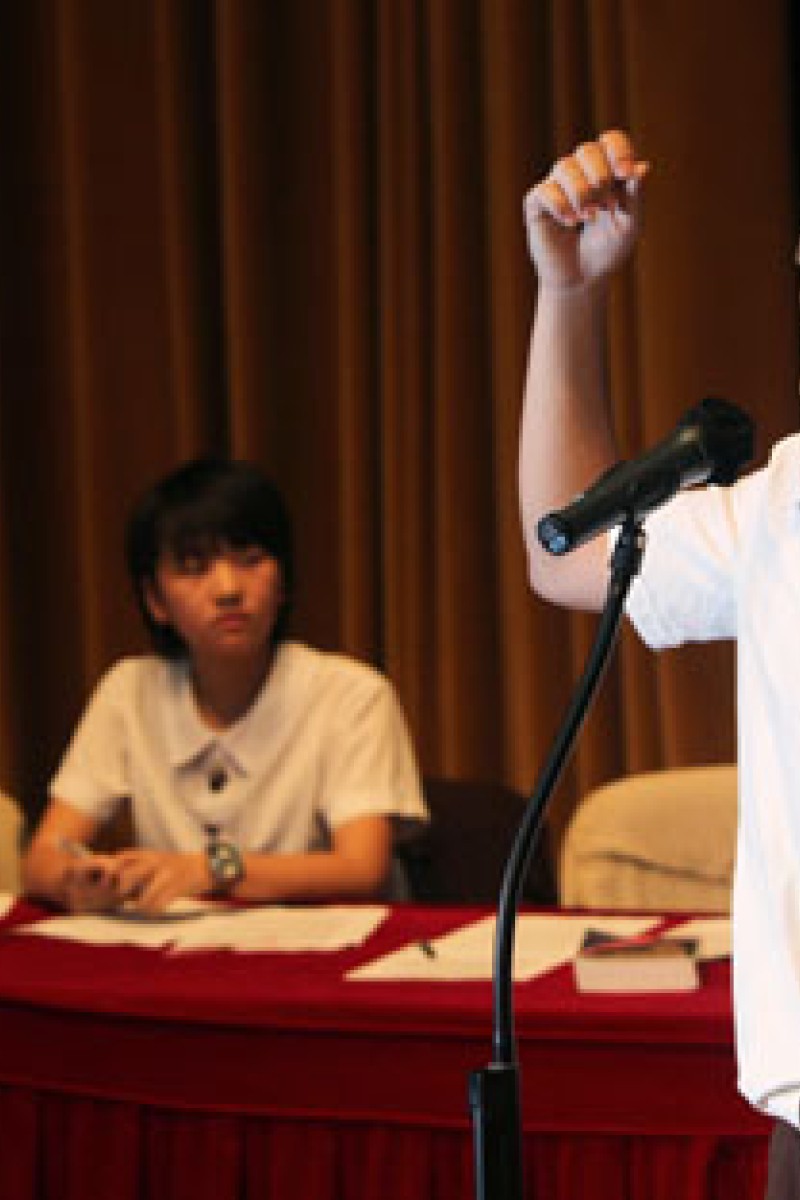
 CCC Ming Kei College student Kelvin Wong Ho-kam (right) makes a point in the Nesta-SCMP debate at Hong Kong Science Museum
CCC Ming Kei College student Kelvin Wong Ho-kam (right) makes a point in the Nesta-SCMP debate at Hong Kong Science MuseumHKFEW Wong Cho Bau Secondary School won a semi-final place in the 11th Nesta-SCMP Inter-School Debating Competition with their sixth-round victory over CCC Ming Kei College.
The two schools locked horns over the motion: "Genetically modified products offer more benefits than drawbacks." The winner held the negative view and Mei Kei the affirmative position in the debate, which was held last Tuesday at the Hong Kong Science Museum. More than 300 students and teachers were present to cheer for the respective sides in a closely fought encounter.
The five judges were Professor Martin Humphries, vice-president and dean of the faculty of life science from The University of Manchester; Michael Evershed and Mary Garland, debating coaches from South Island School; Karen Margetts, a NET from Aberdeen Baptist Lui Ming Choi College; and Barbara Robson of St Antonius Girls' College. The panel of judges gave the edge to the negative side by a vote of three to two.
Both teams came well-prepared with the latest scientific evidence and news reports on the topic. The affirmative side emphasised the benefits of safe, genetically modified products in helping to ease hunger worldwide, earning a round of applause for a solid presentation.
The negative side responded by arguing that genetically engineered crops might be more productive or more adaptable but were bound to destroy biodiversity. They went on to say that genetically modified products benefited the business interests of food production giants in the US, where a handful of companies owned the genetic patents. Speakers warned of the dangers of allowing global food supplies to be monopolised and manipulated. They also questioned how genetically modified crops could relieve food shortages.
Mandy Chau Yu-man, a Form Four student who was the second speaker for the negative side, was declared the debate's best speaker. "The affirmative was having the edge early on, then Mandy came in and really impacted the debate," Evershed said. "She quoted a joint letter from African nations about their reluctance to have genetically modified food. She turned things round for the negative.
"She has more poise, a clear structure and made eye-contact with the audience."
Both teams were praised for their clear team lines and ability to stick to it. "All speakers played their roles well. They are well-coached," Evershed said.
Organised by the Native English Speaking Teachers' Association and the South China Morning Post, the debate is sponsored by the Jockey Club.
For more information about the Nesta-SCMP debating competition, visit http://www.nesta.hk/debating.php
If you have questions or would like to join more than 130 teams already entered in the 12th Nesta-SCMP debating competition starting in late January, contact competition co-ordinator Stan Dyer on [email protected]